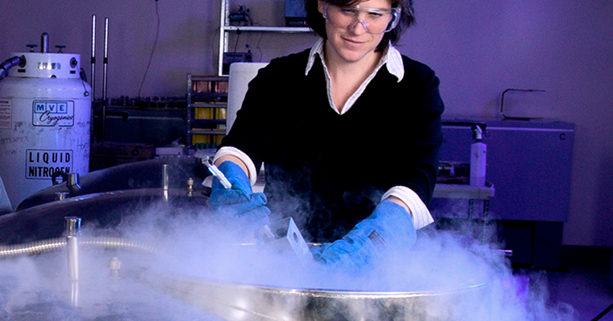EGG FREEZING
When I was 36, I went through a divorce. I found myself single for the first time in 15 years and had no idea what my future would hold. My ex and I had two kids together but I wondered if, one day, I would want to expand my family with someone else. What if I met a great guy when I was 42 and wanted to have kids with him, only to find out it was too late. My fertility had run out. My clock had ticked. So I decided to take control of my clock, and at age 37, I froze my eggs.
In my practice as a gynecologist, I have numerous single women in their mid-30’s who have always dreamed of having a family. But maybe their career took them on another path. Or maybe they just hadn’t met the right guy yet. Whatever the case, the biological clock does not discriminate. The chance of having a baby naturally after age 40 is 5 percent per month. After age 44, the chance is less than 1 percent.
Many of my patients describe their frustrations with dating during their 30’s – wanting to get to know someone, taking their time, yet always being aware that they need to decide if this is someone they could have children with. Adding to the frustration is the fact that men have no such clock. Their fertility is not linked to their age so they can start a family whenever they want.
Egg freezing is one way to even out the playing field. If a woman in her 30’s freezes her eggs, they can be used at any time when she is truly ready to start her family. Years ago, the success rates for egg freezing were dismal. Less than one percent of the eggs would survive the thawing process. Now with newer techniques, the birth rates have increased to nearly 50 percent per embryo transfer. So, while it is not a guarantee, egg freezing gives women the possibility of having a baby later in life.
The process of egg freezing mirrors the first part of in-vitro fertilization (IVF). The cycle takes about 6 weeks to complete. First, your natural menstrual cycle is shut down, usually with birth control pills. Then, you inject yourself with hormones for about 2 weeks. These hormones stimulate your ovaries to produce as many eggs as possible. The younger you are, the more eggs you will make and the better quality they will have. You will see your fertility doctor every few days to monitor the growth of the eggs. When they are mature, the eggs are removed from your ovaries with a needle through the vagina. This is done under anesthesia and you don’t feel a thing. The eggs are then frozen in the lab. You may feel sore and bloated after the eggs are removed, but once you have your next period, you will feel back to normal.
When the time is right, years later, the eggs are thawed and mixed with your partner’s sperm to form embryos. The embryos are inserted into your uterus, and hopefully you are on your way to motherhood.
Egg freezing costs over $10,000, which is expensive for many single women. However, some fertility offices offer payment plans or financing. When selecting an office, it is important to ask if they have any births from frozen eggs, not just frozen embryos. While over 150 clinics in the US provide egg freezing services, few actually have any pregnancies as a result of their techniques.
Five years have passed since I put my eggs on ice. My life is in a different place than I ever thought it would be. Now that my kids are older, I doubt I will ever use those eggs. But I have no regrets about going through the process. Freezing my eggs took a weight off my shoulders. I was free to pursue my relationships in whatever natural direction they took.




Leave a Reply
Want to join the discussion?Feel free to contribute!